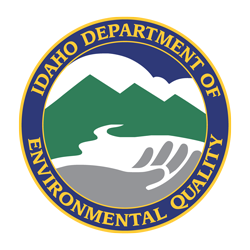Smoke from outdoor burning and woodstoves are a significant source of air pollution in Idaho and can have serious health consequences. However, when properly managed, outdoor burning and burning wood for home heating can occur while still protecting public health.
Because smoke is a potential public health and environmental concern, outdoor open burning is a regulated activity in Idaho. Regulations cover residential, agriculture, forestry, rangeland, weed control burning, and others. By following the air quality rules and implementing basic smoke management practices, open burning can be implemented without causing a health concern.
Common household trash is prohibited from being burned, including plastics, metals, junk mail, cardboard, newsprint, magazines, and packaging. Burning these releases toxic pollutants and some of these pollutants—certain dioxin, furan, and other chlorine-containing compounds—can cause cancer, birth defects, and eye and skin irritation.
Woodstoves can also be a significant source of air pollution and DEQ works closely with communities to promote safe burning practices. Operators can control air pollution from wood smoke and improve a stove’s performance by using the stove properly, burning correct fuels, and upgrading to an EPA-certified woodstove.

